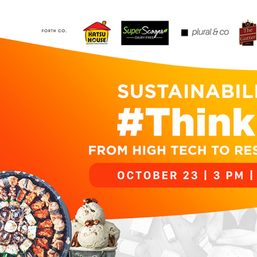SUMMARY
This is AI generated summarization, which may have errors. For context, always refer to the full article.

Missed this year’s #ThinkPH summit? Join the #ThinkPH viewing party on Saturday, September 10! Get your tickets here.
MANILA, Philippines – “We are entering a new world. It’s not an era of change, it’s a whole new era.”
Futurist Yuri Van Geest on Thursday, July 21, opened Rappler’s #ThinkPH event at the Resorts World Manila with a challenge to individuals and organizations who continue to use old mindsets to make sense of the changes brought about by technology.
“It’s the most fascinating time to be alive, but to enjoy it you have to change,” said Van Geest, co-author of “Exponential Organizations,” during Rappler’s annual event, which this year tackled the theme “Back to disruptive basics.” (Check the stellar lineup of speakers here)
Van Geest compared the tech explosion to a tsunami. He warned that people who get caught up in extraordinary sight of the wave rolling in from a distance will only realize it will sweep them away when it’s too late.
Many people see new technology through the lens from the past, Van Geest said.
But the trends are clear, he stressed. To succeed, organizations have to be more flat and nimble and produce a lot without having to spend more. To maximize the talents of millennials, companies have to talk about meaning and purpose, which is what drive the tech-savvy youth today, Van Geest added. To have a future in a world where 80% of jobs will be “impacted by technology,” students have to be strong on the liberal arts – and learn to create, to imagine, to empathize, to have emotional intelligence, to hone their instincts, Van Geest said.
“Liberal arts will be very important. If you digest the arts, you will have different ways to look at the world and that makes people more imaginative. And that will help them direct the future,” he said.
Man and machine
Machines have been able to outcompute humans for ages now, but the real change is that they are now better at learning as well as shown by an AI – artificial intelligence – beating the world’s best GO player earlier this year.
“We saw for the first time that software could make intuitive decisions because GO is much more complex than chess. AI can analyze pattern, and ask its own questions. It’s gotten to the point where people cannot distinguish what is created by a human,” Van Geest said.
This, along with the rise of robotics, will cause a big shift in the labor market in the next 5 years, according to Van Geest.
“You have to learn dance with the machine and if you don’t you’re in trouble,” Van Geest emphasized. “This is the symbiosis of man and machine.”
Exponential organizations
The situation has created a new type of economic force, the exponential organization.
Also called Unicorns in tech circles, some of these firms – Google, Facebook, along with newer ones, tesla, Snapchat, Uber and Oculus Rift – are what people are already familiar with.
Van Geest defined these firms as those whose impact or output is disproportionally large – at least 10x larger compared to its peers because of their use of new organizational techniques that leverage exponential technologies.
“You can see this in the time it takes to become a billion-dollar company. Where it used to take 20 years on average, 20 years ago, today it’s less than 9 months as proven by the corporate messaging firm Slack,” he said.
Another reason, he added, is that the global economy is moving from a scarcity model, wherein the goal was to corner the market on goods, to an abundance model wherein creating value and sharing is the new norm.
“If you have scarcity you have to own things to have a competitive advantage, but with abundance, it’s not about ownership, it’s about access, which has led to the rise of the sharing economy,” he explained.
This also compels rethinking in how organizations are structured.
“Nobody uses mobile phones from 15 years, so it doesn’t make sense to use systems of organization from a century either,” Van Geest pointed out.
Transformative purpose
Beyond being lean, these exponential organizations have another key factor in their favor. They have, as Van Geest put it, a “massive transformative purpose.”
“It’s the glue that holds the organization together,” he explained. “The new generation wants purpose, meaningful work because just making money will become less important with time as wealth is created at an unprecedented rate.”
Thus, the best and the brightest will be attracted to work that allows them self-expression and provides meaning, he added.
Singularity University
Van Geest is the founder of the Singularity University in the Netherlands, a satellite of the Singularity University started in Silicon Valley by tech visionaries Ray Kurzweil, Peter Diamandis and Google’s Larry Page among others.
It focuses on emerging exponential technologies and aims to figure out how to create startups that affect a billion people by tackling the world’s biggest problems; water, food, energy, healthcare, education, poverty, and climate change.
One of its products is Made in Space, the first firm that allows 3D printing of spare parts in space, the first time humans have ever produced anything outside Earth.
The organization is named after the wave that’s coming – singularity, to describe an era where humans basically use technology to transcend natural barriers.
At its extreme, it denotes the end of the current era and brings about a new one where artificial intelligence (AI) and technological advancement runs at a rate that isn’t comprehensible.
“Half a year ago we developed a new quantum computer that was 100 million times faster than a conventional computer, think of the implications then for AI, optimization problems,” Van Geest said.
“But the real news,” he added,” is that within the next 2 years, the next computer will have the computational power of all the computers combined on Earth.”
“You have to learn to dance with the machine and if you don’t, you’re in trouble,” Van Geest emphasized.
Access to all
Naturally, the singularity deals with technology that is at the very cutting edge as well as that which is on the fringes of what’s possible; artificial intelligence, biotech, nanotech, neuroscience, 4D printing, and block chain.
“All of these fields have doubled in capacity, some faster, some slower,” Van Geest pointed out, but most importantly, “they are converging to create a new world.”
But the real reason it’s doing so is that all these advancements are becoming extremely accessible. Van Geest pointed out the fact that it used to take $10 million to sequence an individual’s DNA, whereas today it only costs $100. That opens almost limitless possibilities for personalized medicine.
He also predicted that in the next 5 years wearables like the Apple watch will use advanced sensors to be able to diagnose cancer.
All tech that not too long ago seemed avant-garde has been brought to the mass-market: drones used to cost $100,000 average while it’s around $700 now. The price of industrial robots that used to average $500,000 in 2008 averaged $22,000 by 2013.
Solar energy is widely tipped to change the world, and the reason for this is that where it used to cost $30 per kilowatt hours (kwh) 20 years ago, it averaged $0.14 per kwh in 2014 led by a steep decline in solar panels.
The key to thriving in this new environment, he said, is to disrupt yourself, constantly viewing life as a permanent museum.
“Start tomorrow, don’t delay. You don’t want to be that person watching from the shore not realizing that the wave is upon him,” said Van Geest. – Rappler.com
The world is getting an upgrade, and it needs talent to make it grow even more. Click here to apply for IT and Software jobs on the Rappler x Kalibrr Job Board!
Add a comment
How does this make you feel?










There are no comments yet. Add your comment to start the conversation.